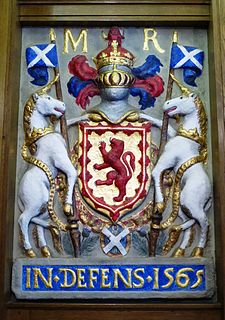Related Research Articles

The Ninth Amendment to the United States Constitution addresses rights, retained by the people, that are not specifically enumerated in the Constitution. It is part of the Bill of Rights. The amendment was introduced during the drafting of the Bill of Rights when some of the American founders became concerned that future generations might argue that, because a certain right was not listed in the Bill of Rights, it did not exist. However, the Ninth Amendment has rarely played any role in U.S. constitutional law, and until the 1980s was often considered "forgotten" or "irrelevant" by many legal academics.

Autocracy is a system of government in which absolute power over a state is concentrated in the hands of one person, whose decisions are subject neither to external legal restraints nor to regularized mechanisms of popular control.
Brown v. Board of Education of Topeka, 347 U.S. 483 (1954), was a landmark decision of the U.S. Supreme Court in which the Court ruled that U.S. state laws establishing racial segregation in public schools are unconstitutional, even if the segregated schools are otherwise equal in quality. The Court's decision partially overruled its 1896 decision Plessy v. Ferguson, declaring that the "separate but equal" notion was unconstitutional for American public schools and educational facilities. It paved the way for integration and was a major victory of the civil rights movement, and a model for many future impact litigation cases.
Primogeniture ( ) is the right, by law or custom, of the firstborn legitimate child to inherit the parent's entire or main estate in preference to shared inheritance among all or some children, any illegitimate child or any collateral relative. In most contexts it means the inheritance of the firstborn son ; it can also mean by the firstborn daughter.

Ex parte Merryman, 17 F. Cas. 144 (No. 9487), is a well-known and controversial U.S. federal court case that arose out of the American Civil War. It was a test of the authority of the President to suspend "the privilege of the writ of habeas corpus" under the Constitution's Suspension Clause, when Congress was in recess and therefore unavailable to do so itself. More generally, the case raised questions about the ability of the executive branch to decline enforcement of judicial decisions when the executive believes them to be erroneous and harmful to its own legal powers.

The Court of Chancery was a court of equity in England and Wales that followed a set of loose rules to avoid the slow pace of change and possible harshness of the common law. The Chancery had jurisdiction over all matters of equity, including trusts, land law, the estates of lunatics and the guardianship of infants. Its initial role was somewhat different: as an extension of the lord chancellor's role as Keeper of the King's Conscience, the court was an administrative body primarily concerned with conscientious law. Thus the Court of Chancery had a far greater remit than the common law courts, whose decisions it had the jurisdiction to overrule for much of its existence, and was far more flexible. Until the 19th century, the Court of Chancery could apply a far wider range of remedies than common law courts, such as specific performance and injunctions, and had some power to grant damages in special circumstances. With the shift of the Exchequer of Pleas towards a common law court and loss of its equitable jurisdiction by the Administration of Justice Act 1841, the Chancery became the only national equitable body in the English legal system.
Korematsu v. United States, 323 U.S. 214 (1944), was a landmark decision by the Supreme Court of the United States to uphold the exclusion of Japanese Americans from the West Coast Military Area during World War II. The decision has been widely criticized, with some scholars describing it as "an odious and discredited artifact of popular bigotry", and as "a stain on American jurisprudence". Chief Justice John Roberts explicitly repudiated the Korematsu decision in his majority opinion in the 2018 case of Trump v. Hawaii. The case is often cited as one of the worst Supreme Court decisions of all time.

The Kingdom of England was a sovereign state on the island of Great Britain from 12 July 927, when it emerged from various Anglo-Saxon kingdoms, until 1 May 1707, when it united with Scotland to form the Kingdom of Great Britain. The Kingdom of England was among the most powerful states in Europe during the medieval period.

King of Italy was the title given to the ruler of the Kingdom of Italy after the fall of the Western Roman Empire. The first to take the title was Odoacer, a barbarian military leader, in the late 5th century, followed by the Ostrogothic kings up to the mid-6th century. With the Frankish conquest of Italy in the 8th century, the Carolingians assumed the title, which was maintained by subsequent Holy Roman Emperors throughout the Middle Ages. The last Emperor to claim the title was Charles V in the 16th century. During this period, the holders of the title were crowned with the Iron Crown of Lombardy.

John Bradshaw was an English jurist. He is most notable for his role as President of the High Court of Justice for the trial of King Charles I and as the first Lord President of the Council of State of the English Commonwealth.
In tort law, detinue is an action to recover for the wrongful taking of personal property. It is initiated by an individual who claims to have a greater right to their immediate possession than the current possessor. For an action in detinue to succeed, a claimant must first prove that he had better right to possession of the chattel than the defendant and second that the defendant refused to return the chattel once demanded by the claimant.

Latin liturgical rites, or Western liturgical rites, are Catholic rites of public worship employed by the Latin Church, the largest particular church sui iuris of the Catholic Church, that originated in Europe where the Latin language once dominated. Its language is now known as Ecclesiastical Latin. The most used rite is the Roman Rite.

The Montana Supreme Court is the highest court of the state court system in the U.S. state of Montana. It is established and its powers defined by Article VII of the 1972 Montana Constitution. It is primarily an appellate court which reviews civil and criminal decisions of Montana's trial courts of general jurisdiction and certain specialized legislative courts, only having original jurisdiction in a limited number of actions. The court's Chief Justice and six Associate Justices are elected by non-partisan, popular elections. The Montana Supreme Court meets in the Joseph P. Mazurek Building in Helena, Montana, the state's capital, an international style building completed in 1982 and named in the honor of former Montana Attorney General, Joseph P. Mazurek.
"Justice delayed is justice denied" is a legal maxim. It means that if legal redress or equitable relief to an injured party is available, but is not forthcoming in a timely fashion, it is effectively the same as having no remedy at all.

Superior orders, also known as the Nuremberg defense or just following orders, is a plea in a court of law that a person, whether a member of the military, law enforcement, a firefighting force, or the civilian population, should not be considered guilty of committing actions that were ordered by a superior officer or official.
An obscenity is any utterance or act that strongly offends the prevalent morality of the time. It is derived from the Latin obscēnus, obscaenus, "boding ill; disgusting; indecent", of uncertain etymology. The word can be used to indicate strong moral repugnance and outrage, in expressions such as "obscene profits" and "the obscenity of war". As a legal term, it usually refers to graphic depictions of people engaged in sexual and excretory activity, and related utterances of profane speech.
O'Connor v. Ortega, 480 U.S. 709 (1987), is a United States Supreme Court decision on the Fourth Amendment rights of government employees with regard to administrative searches in the workplace, during investigations by supervisors for violations of employee policy rather than by law enforcement for criminal offenses. It was brought by Magno Ortega, a doctor at a California state hospital after his supervisors found allegedly inculpatory evidence in his office while he was on administrative leave pending an investigation of alleged misconduct. Some of what they uncovered was later used to impeach a witness who testified on his behalf at the hearing where he unsuccessfully appealed his dismissal.

Government in early modern Scotland included all forms of administration, from the crown, through national institutions, to systems of local government and the law, between the early sixteenth century and the mid-eighteenth century. It roughly corresponds to the early modern era in Europe, beginning with the Renaissance and Reformation and ending with the last Jacobite risings and the beginnings of the industrial revolution. Monarchs of this period were the Stuarts: James IV, James V, Mary Queen of Scots, James VI, Charles I, Charles II, James VII, William III and Mary II, Anne, and the Hanoverians: George I and George II.
Kingsley Books, Inc. v. Brown, 354 U.S. 436 (1957), was a Supreme Court case that addressed issues of obscenity, free speech, and due process. The case stemmed from the confiscation and destruction of books from a New York City bookstore. The court's determination was that:
A state injunction against distribution of material designated as "obscene" does not violate freedom of speech and press protected by the First Amendment and the Due Process Clause of the Fourteenth Amendment.

The Palace letters, sometimes labelled as the Palace papers, refers to letters between Queen Elizabeth, through her Private Secretary Martin Charteris, and Australian Governor-General Sir John Kerr around the time of the 1975 constitutional crisis, in which Kerr dismissed Australian Prime Minister Gough Whitlam. The phrase 'Palace letters' originated in the work of Australian historian and Whitlam biographer Professor Jenny Hocking, who successfully overturned the Queen's embargo over these letters, as a reference to Buckingham Palace, the official residence of Queen Elizabeth in London.
References
Citations
- ↑ Quintrell, B. W. (1980), "The Making of Charles I's Book of Orders", English Historical Review, XCV (CCCLXXVI): 553–572, doi:10.1093/ehr/xcv.ccclxxvi.553, archived from the original on 3 October 2006(subscription required)
- ↑ Kishlansky, Mark A. (1997). A monarchy transformed : Britain 1603-1714. London: Penguin Books. p. 119. ISBN 9780140148275.